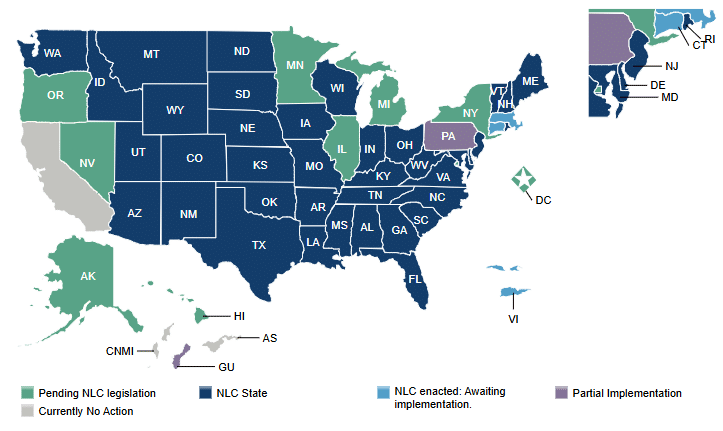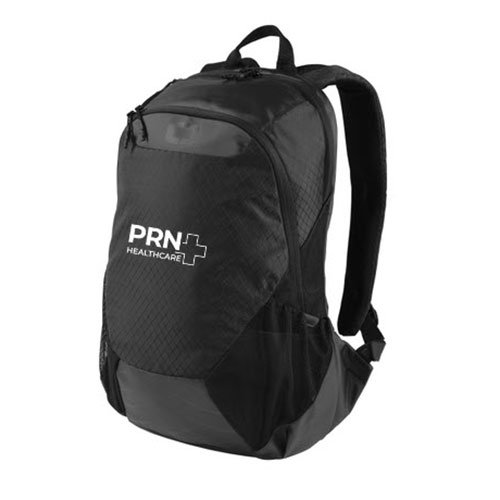Table of Contents
Travel nursing offers a rewarding and dynamic career path, helping to address staffing shortages across the country. Employment opportunities for nurses are expected to grow rapidly, with the US Bureau of Labor Statistics projecting a 9% growth rate for nursing jobs from 2016 to 2026—faster than many other professions. Given the high demand for nurses, travel nursing offers a fantastic opportunity. However, before taking the leap, it’s important to assess whether travel nursing is the right fit for you and understand the steps involved in becoming a travel nurse.

How To Become a Travel Nurse:
- Become a Nurse
- Obtain State Licensure
- Figure out if travel nursing is right for you
- Gain at least one year experience
- Understand the salary for travel nurses
- Find your perfect travel nurse agency
Become A Nurse
Earn a Bachelor of Science in Nursing (BSN) or Associate Degree in Nursing (ADN)
Hospitals require travel nurses to have an ADN or BSN degree from an accredited university. Both degrees come with pros and cons and differ slightly when it comes to how long it takes to earn, the curriculum, NCLEX pass rates, and earning potential.
Nursing Degree Costs
Associate Degree in Nursing (ADN) Cost
On average, a student pursuing an Associate’s Degree in Nursing (ADN) can expect their tuition bill to run anywhere from $6,000 to $40,000. This degree typically takes two years to receive. It is important to keep in mind that the total cost will depend on the state you live in and the type of college you choose.
Bachelor’s of Science in Nursing (BSN) Cost
If you are looking to obtain your Bachelor’s of Science in Nursing (BSN) you can plan on the total cost running anywhere from $40,000 to over $100,000. This degree typically takes four years to receive. Again, keep in mind that the total cost will depend on the state you live in and the type of college you choose.
A BSN usually takes four years, with the first two years focused on general studies and the last two on nursing coursework and clinicals. An ADN takes two years and emphasizes hands-on training, including labs and clinicals. Both programs can be stressful, so lean on classmates, connect with professors, and join Facebook groups for support. Also, use helpful apps to prep for exams and the NCLEX.
Comparing ADN and BSN Degrees
The main difference between an ADN and a BSN degree is a time of completion and earning potential. While you can earn an ADN faster, your earning potential is not as high as someone who has a BSN degree. This may be because BSN earners are favored to have more opportunities to move into leadership opportunities with experience.
| Degrees | ADN | BSN |
| Completion Duration | 2 years | 4 years |
| Curriculum | Clinical and lab trainings with core nursing coursework | Prerequisites, clinical and lab skills, training in leadership, research, and nursing management |
| NCLEX Pass Rate | 77.9% | 82.3% |
| Estimated Salary Range | $69,660-$75,000 annually | $85,000- $92,000 annually |
| Option to Travel Nurse | Yes | Yes |
Pass NCLEX Exam to Become A RN
To become a registered nurse, you must pass the National Council Licensure Examination (NCLEX) exam. The NCLEX is a comprehensive nursing exam that tests the knowledge, skills, and abilities of the test taker. Unlike other knowledge-based exams in school, this exam focuses on the application and critical thinking skills that reflect real-world nursing problems. Below is an example of NCLEX question:
A 23-year-old woman with insulin dependent diabetes mellitus (IDDM) is returned to the recovery room one hour after an uneventful delivery of a 9 lb., 8 oz., baby boy. The nurse would expect the woman’s blood sugar to:
- rise B. fall C. remain stationary D. fluctuate
You can see this exam question is comprehensive of different aspects and specialties of nursing. To correctly answer you must take into consideration the pathology of diabetes and the principles of labor and delivery. The correct answer is B.
Make sure to register and schedule your NCLEX exam in advance as available spots fill up quickly!
Obtain State Licensure
 *Photo sourced from NCSBN
*Photo sourced from NCSBNAfter you pass the NCLEX, you can apply for a multi-state license if you live in one of the 43 states that are part of the Nursing Licensure Compact program. As a future travel nurse securing a compact nursing license is ideal. This program allows you to travel to other states in the program and practice nursing without additional certifications or licensures. If your state is not in the NLC, then you will have to apply for a single-state license in your state and in the states you hope to travel nurse in. Apply for your nursing license right away, as it takes a few weeks to process.
Is Travel Nursing Right for You?
To determine if travel nursing is the right fit for you, it’s important to reflect on your own values and career goals. What truly matters to you? What are you hoping to achieve in your career? Travel nurses tend to share certain traits that contribute to their success—traits that come naturally to some, but not everyone. And that’s perfectly okay!
Travel Nurses Are Adventurous
Travel nurses are all about embracing adventure! Every 13 weeks, they get the chance to explore new facilities and locations, unless they decide to extend their contract. While you don’t always have to leave your home state, we highly encourage trying cross-country assignments if you’re open to it. Traveling across the country gives you the opportunity to snag the best pay rates while enjoying incredible locations at the ideal times! For instance, if you love skiing, Colorado is a fantastic option during the winter. On the flip side, if you’re not a fan of the cold, you can head south for some sunshine and warmth. One of the greatest perks of travel nursing is the ability to travel and get paid for the experience!
Travel Nurses Are Adaptable

Adaptability is a key skill for travel nurses. Every 13 weeks, they start fresh at a new facility, in a new city, and with new colleagues. While a change of scenery can be invigorating for some, it can be stressful for others. If you’re someone who struggles with change, travel nursing might not be the best fit. However, if you tend to get bored easily, travel nursing can keep your work exciting and fulfilling. The more flexible you are, the better your opportunities. Factors like pay, demand, and location all play a role in contract decisions, and being open to different locations can open up a wealth of great choices!
Travel Nurses Desire Flexibility and Higher Pay
Flexibility is one of the biggest perks of travel nursing, and it’s something many nurses value! Travel nurses often earn more than staff nurses. According to TravelNursing.org, the average annual salary for a travel nurse in 2022 was $108,070, significantly higher than the $75,330 per year for staff nurses, as reported by the Bureau of Labor Statistics (BLS). This higher pay gives travel nurses more freedom to take time off. Many choose to work several contracts in a row and then take a month off to relax, travel, or spend time with loved ones. The extra income helps support a lifestyle that balances work and personal enjoyment, which can reduce burnout and enhance overall satisfaction.
Here are some other signs you would love travel nursing!
When thinking about becoming a travel nurse, you must consider which kind of travel nurse you want to be. This comes down to the nursing specialty.
Gain At Least One Year of Experience
Once you achieve a BSN and pass the NCLEX, you can start landing your first nursing job without additional training. Some new nurses prefer to start their careers in a Nurse Residency Program to attain new credentials and skills. Whatever path you choose, you must gain at least one year of experience within the last two years in any given specialty to become a travel nurse.
Things To Consider When Choosing a Nursing Specialty
Hospitals and facilities require travelers to have at least one year of experience under their belt to protect the nurse’s licensure and ensure excellent patient care. The more experience you have, the more attractive you will look to potential employers. Once you have one year of experience, travel nursing is a great way to build your resume and experience!
Factors to Keep in Mind:
- Population you want to work with
- The pace of your workday
- Type of Ailments patients may be experiencing
- Skills performed on a daily basis
- Annual Salary
Nurses often choose specialties based on the population they care for, such as working with babies or the elderly. For example, if you enjoy newborn care, consider areas like labor and delivery, NICU, or pediatrics. Some are drawn to the pace of a specialty, like the fast-paced ER, while others prefer a clinic setting. Specialties may also be chosen based on the types of ailments treated or specific skills used. Salary potential can also influence the decision.
What is the Salary of a Travel Nurse?
Some people start to wonder about how to become a travel nurse after hearing about the salary potential of travel nursing. It’s no secret travel nurses make great money; they tend to make the same if not more then a staff nurse. Keep in mind rates increase and decrease for many reasons so there is no straight answer to “How much do travel nurses make?”

Factors in Travel Nurse Salary
- Location
- Cost of Living
- Demand for Nurses
- Nurse Specialty
- Experience
Travel Contract Location
Rates vary by state and city; here is a list of travel nurse salaries based on state. Keep in mind some states pay a lot higher than other states because of the cost of living. For example, California pays almost $52,000 per year more than Alabama. This is because it costs more to live and eat in California than in Alabama. California also probably has a higher need for nurses than Alabama. These are all pieces that build a travel nurse pay package!
High Paying Nurse Specialties
Another factor in travel nurse salary is the specialty. Some specialties have higher demand and, in turn, higher pay! One of the highest paying specialties is an operating room nurse, followed closely by Labor and delivery nurses! Check out other high-paying specialties here.
Experience Impacts Pay
Experience is also attributed to income. The more experience you have, the better! Travel nursing is a great way to build your resume. It shows you are successful in many different environments and with different people. The more certifications you can obtain, the more attractive you will look to a future employer and the more they will pay to have you on the team. Nurses never stop learning! Embrace that with diverse experiences and learning opportunities.
Find a Travel Nursing Agency
About three months before reaching one year of experience, start researching travel nurse agencies. This gives you time to explore job options and connect with recruiters. With many agencies to choose from, focus on finding one that aligns with your values, offers a variety of jobs, and has a recruiter you can work well with. Here’s what to look for when choosing an agency.
5 Key Factors to Consider When Choosing a Travel Nursing Agency
- Job Opportunities in Your Specialization
Your agency needs to offer competitive assignments in your area of expertise. Even if you like the agency, you won’t stick around if the jobs don’t align with your specialty. Check their job listings on the agency’s website for opportunities in your preferred states and cities. If you don’t see what you’re looking for, reach out to your recruiter – opportunities can come up at any time, and they might have unlisted positions. - Joint Commission Certification
Before signing on with an agency, ensure they are Joint Commission Certified. This certification signifies that the agency adheres to the highest staffing standards. Think of it as a gold standard for healthcare staffing, ensuring the agency follows best practices and offers superior service. Working with a Joint Commission-certified agency ensures a higher level of professionalism and consistency. - Experienced and Transparent Recruiters
Once you choose an agency, your next step is selecting a recruiter. Look for recruiters who genuinely understand travel nursing, not just as a job, but as a career. Experienced recruiters can guide you through the process, ensuring your goals align with the right assignments. Make sure your recruiter is honest, knowledgeable, transparent, a great communicator, and compassionate. - Round-the-Clock Support
Travel nurses often work unconventional hours, so having access to 24/7 support is essential. Whether you’re facing issues on the job or need answers to pre-shift questions, knowing you can get immediate assistance whenever needed will bring peace of mind. Look for an agency that guarantees round-the-clock support to help resolve any concerns, day or night.
- Agency Reputation and Referrals
Just like checking reviews before trying a new restaurant, research travel nursing agencies before committing. Ask fellow nurses for recommendations, and check online reviews on platforms like Facebook, Google, and Glassdoor to get insight into an agency’s strengths and weaknesses. Learning from others’ experiences can help you make a better decision.
We hope this blog has clarified how to become a travel nurse. After earning your BSN and passing the NCLEX, the next step is gaining one year of experience in a specialty. Once that’s done, the exciting part begins—finding contracts!
Travel nursing is such a rewarding and exciting career. If you have any questions on how to become a travel nurse, we have knowledgeable recruiters ready to chat with you!




